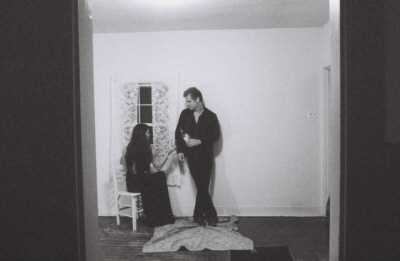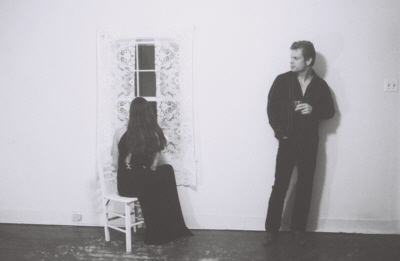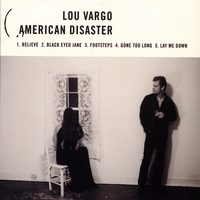
Lou Vargo
talks about
"American Disaster"
by Johanna J. Bodde
LOU VARGO talks about "American Disaster" (Self-Released) How I came to record “American
Disaster”:
One morning in September (I think it was September)
of 2006, I sat in a bakery near my house and called everyone I know in the music
business from shear frustration. Frustration from the lack of progress I
had been making since moving to Nashville. For a couple of months I was
supposed to make a 3-song demo with someone in town. We would spend one
day doing three songs that I would be able to shop to labels and publishing
houses and such. It had been put off and put off and put off. I was
done.
I sat at a place call Merridee’s Bakery just going through my address book and without thinking too much about it and called everyone I know… and didn’t know. I knew I had the material and wanted desperately to make a record. When I got to Jack Hale’s name in my book, I left him a message telling him that I didn’t know whether he would want to work with me, but if he could point me in the direction of someone he respected that might want to work with me that I would appreciate it. About an hour later he called me back. A couple days later I was sitting in his studio playing every song I had for him. He listened closely, asking me to play some songs again. Between songs we talked about art and our frustration with Music Row and our approach to music and told stories…just got to know each other. After a couple of hours of this he asked me to come back the next day. So I did. And we met for another couple of hours. At the end of that meeting he said, “Lou, let’s make a record!” Production:
The approach we took in production was to let the
songs lead the production and not force a certain type of standard (drums, bass,
guitar) instrumentation. At a pretty early point in the recording of each
song, we both realized that we needed to stay out of the way of the vocal…that
the power of the songs would be lost if there was too much
instrumentation.
Writing Habits: I don’t write
what I consider to be a lot of songs. I try to write most days but
certainly don’t write every day. I don’t write with anybody else. When I’m
reading a lot I tend to write more. Right now I’m reading Walt Whitman’s
“Leaves of Grass.” In the past six or eight months I’ve gotten into Cormac
McCarthy. My mind is opened up and seeing the little movies in my head I
need to see in order to start a song. I start a lot of songs but don’t
finish them because I realize early that they are not going to work. Some
“music industry professionals” would say not to do that. But finishing a
shitty song and putting creative energy toward something that I don’t think will
work from the outset doesn’t make sense to me.
What I Write About: My songs are
not about specific events. They are a collection of events that probably
happened in my life a long time ago. I need a long time to make sense of
something in my mind before I can start writing about it. I need distance,
space.
The Title: “American Disaster” is not
the direct political statement that a lot of people think it is. These
songs are about little American disasters that happen every day between men and
women, sons and fathers, brothers and sisters, between lovers, between
people. Personal disasters that nobody else knows about but effect an
individual’s life just as much as any national tragedy.
It always bothers me when you see a government come in and say, “We’re going to rescue these unfortunate Americans from this tragedy!” whether it’s Katrina or the Mississippi floods of ’93 or 9/11. While at the same time, if this same group of people were experiencing a personal tragedy on the same level but disparately and under separate circumstances, the President would be calling any help for them “Unnecessary government intervention”. Think about health care in America, hunger, the U.S. tax code, how my government is treating the country’s veterans. Eighteen thousand people die every year in my country simply because they don’t have health care. They don’t die in a hurricane or a terrorist attack, so it is more difficult to conceptualize it. That’s really the “American Disaster”. It’s happening right now. It has been happening. People in the U.S. are experiencing tragedies for so many different reasons, more so now than six or seven years ago. These are personal and disparate and preventable and, thus, tragic. And the story needs to be talked about and thought about on that level. |
 Why I don’t have a television:
That is a conscious decision on my part. I have not had one since 2001
when I got divorced. My ex-wife got the big Sony Trinitron and I never
replaced it. I used to miss a few things, hockey and seeing Detroit Red
Wings games. But I find I have a lot more of a life. I tell people
that I don’t have a TV and they look at me like a have a second head growing out
of my shoulders and ask, “What do you do?” I tell them that I live
life.
Footnote: In fact, saying I don’t have a TV is
technically a lie. I do have a television. My mother was so worried
about the fact I didn’t have a TV, before she died in 2004 she made sure that I
would get her television. It’s in my music room next to my eight track
recorder. It’s unplugged and has some harmonicas on it. I plugged it
in once but all I got was static. Sometimes when I look at it I smile and
think of my mom and how crazy she must have thought I was.
The
Musicians:
JACK HALE: I consider Jack my musical soul mate. We work great together. We have mutual respect for each other. He understands what it is I need to do artistically and I trust him completely. He’s making me an infinitely better musician. He’s worked with legends throughout his 35 year career as a producer, engineer and even early with the Memphis Horns from the time he was 17! When you are around his kind of experience, talent and soul and it makes you a better musician (and, in Jack’s case, a better person, too)...and you wouldn’t think he could play cello like that, would you? JOE SMYTH: Joe has been the drummer in Sawyer Brown for 26 years. He has been a good friend of mine since shortly after I moved to Nashville in 2003. He is by far the best drummer I’ve ever played with and the finest people I know. I can’t think of anyone I would rather have on my record. DAVE ROE: An absolute pro…with groove to spare. He and Jack Hale worked together for 10 years with Johnny Cash. We had him and Joe Smyth come in on the same session to record their tracks for “Gone Too Long”. Dave walked in, wrote the charts and in two takes we had the drums and bass you hear on the CD. AL PERKINS: I met Al through Robert Reynolds of The Mavericks. Al has more talent and class in his little finger than most people could ever dream of having…I mean, the guy has played with Gram Parsons, Dylan and the Stones! When Al played the pedal steel track to “Lay Me Down”, it was just Al, Jack and me in the studio. As I listened to the vocal and guitar tracks and listened and watched Al play the track that is on the CD, I got choked up it was so moving. STUART DUNCAN: When we decided to put fiddle on “Believe”, Jack said that he would call Stuart. I had never heard of him. Little did I know that Stuart is one of the, if not the, best fiddle players in the world. Listen to the subtlety and finesse he has. The only time we could get him was when I was going to be out of the country. Jack had him do about 10 passes at the song so we would be sure that we had enough tracks since I couldn’t be there to give my OK. I talked to Jack from Norway, and I could tell from the tone in his voice that we got exactly what we wanted. Thank you, Stuart…maybe someday we can meet.  |
